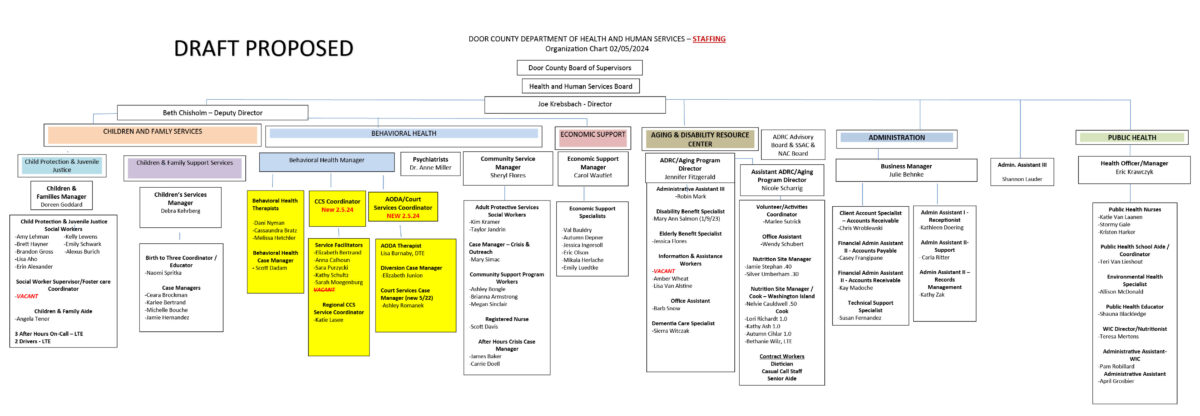In response to sharp increases in people seeking services for alcohol and other drug-related issues, the Door County Health and Human Services Board on Monday approved the next steps as determined by department staff toward making a county-run sober living facility a reality.
Additionally, bigger AODA and behavioral health caseloads combined with recent staff vacancies make it a good time to make a dramatic overhaul in the department’s organizational structure, according to Health and Human Services Department director Joe Krebsbach. The board voted in favor of the overhaul as well.
Both measures will be sent as resolutions to the county administrative and finance committees for approval before they go to the County Board for final approval.
Sober living
A lack of adequate sober living facilities is a significant gap in services in Door County, HHS representatives and county service providers have said. At the HHS board’s regular meeting on Monday, the department sought to close some of that gap.
Door County received funds over the past few years from the federal government as part of the American Rescue Plan Act. Some of those funds have been earmarked for construction of a sober living facility, according to Krebsbach. HHS is now asking the County Board to transfer $15,000 of the earmarked funds toward a contract with an outside consulting organization for the sober living project.
The consulting organization, CORE Treatment Services, Inc., operates sober living facilities in other northern Wisconsin communities, including Manitowoc and Shawano. “Phase One” of the contract with CORE would include “community assessment, clarification of objectives and the framework required for launching a successful sober living facility in our community,” according to the resolution that will go before the County Board.
CORE began its consulting arm “to leverage our team’s skills, knowledge, and experience to identify small rural communities that share our passion for community impact,” according to the organization’s proposal for the project. “Our goal is to replicate the success we have achieved in Manitowoc and ensure that patients who complete treatment at our center have access to local resources in their communities that can support their continued journey to wellness.”
Structural overhaul
At the meeting, Krebsbach reported that in 2023, 43 children were put in out-of-home placement, and most of them were from families impacted by drug use. In 2022 there were 28 out-of-home placements from January to September, which matched the total number for the year in 2021.
Out-of-home placements take place through HHS’s child welfare staff. There is no doubt those kinds of cases are going up, Krebsbach added, and the services needed to support the families involved are becoming more complex. Staffing shortages have been an ongoing issue for the department with some positions staying open for months.
Most recently, Behavioral Health Manager Donna Altepeter gave notice in August 2023 of her retirement in January of this year, and Court Services Coordinator Kelsey Christensen also resigned last September. Altepeter’s position has been posted for more than four months, with only two applicants. Neither of them were qualified, Krebsbach said. The department has been operating with a shortage of AODA therapists for at least a year as well, Knock has previously reported.
Neither supervisory position has been filled, Krebsbach said, making now a good time to go forward with some structural overhaul to better serve the community’s evolving needs. The changes would entail eliminating some positions and creating new ones that have broader oversight, he said in his report to the committee on Monday.
The most significant change would be within the Behavioral Health Manager duties, Krebsbach explained in a memo to the board. “The position would have oversight of a broader area, including the outpatient clinic as always, the Comprehensive Community Service program and the Court Services divisions. Historically the latter two have had separate managers,” the memo stated. (Disclosure: Knock designer Taylor Schultz’s mother, Kathy Schultz, is a service provider with the Comprehensive Community Service program.)
The shift will be complicated at first, Krebsback said, as it entails rewriting job descriptions and shifting hierarchies and responsibilities within departments. The restructure also comes with a higher price tag. Even though the department would be eliminating some positions, the money saved by doing so would be used to create positions with more responsibility and oversight, which means higher salaries.
The fiscal impact of the overhaul would result in a net increase of $23,677 in the HHS budget for 2024. Though the HHS board approved the changes, the county administrative and finance committees will weigh in before the County Board has the final say.

